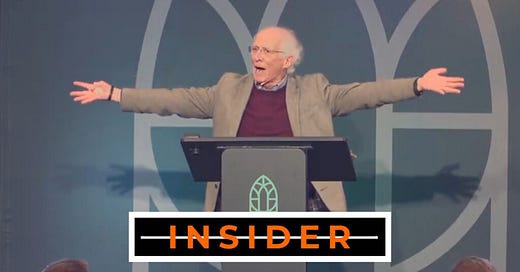Pro tip: Don’t listen to a Christian preacher who can’t say with absolute confidence that his salvation is secure, no matter how many of his books are on your shelf.
In yet another concerning theological stumble, John Piper has muddied the waters of biblical understanding. This time, he’s pushing a dangerous narrative that Christians can potentially “shipwreck” their faith and lose salvation – a claim that strikes at the heart of biblical assurance. During a recent conference appearance, Piper suggested that believers could potentially fall away, and bizarrely claimed he keeps people “saved” through his preaching. This isn’t just problematic – it’s a potential assault on the doctrine of eternal security.
This isn’t just theological nitpicking. Piper’s teaching creates a spiritual minefield of constant doubt and fear. It’s Catholicism lite – suggesting that salvation is a precarious balancing act where one wrong move could send you tumbling into eternal separation. Yet scripture is abundantly clear. Those truly called by God are eternally secure. Election isn’t a maybe; it’s a certainty. When God saves you, He keeps you. Period.
Piper has had several recent and troubling errors. From his inexcusable positions on self-defense and COVID “vaccines” to his recent claim that our love for Jesus is “erotic to the core,” Piper’s once-unassailable reformed street cred has crumbled.
John Piper’s teachings on Christian Hedonism and final justification provide the backdrop for an important theological critique. His interpretation of the “falling away” passages in the clip directs believers inward, focusing on internal interrogation. Yet the Bible’s warnings about falling away (e.g., Hebrews 3:12) are not about internalized self-examination—they’re a call for collective accountability and discipline within the church. They are instructions given to groups of Christians, intended to be applied among groups of Christians.
The Biblical Call to Mutual Accountability
When rightly understood, Hebrews 3:13 shows us the essential role of mutual testing and exhortation among believers. The warning to guard against a hardened heart is a corporate command—not merely an individual one. Piper’s approach shifts the focus inward, encouraging believers to search their own hearts for assurance, even going so far as to claim that he himself (who can see his own heart before the Lord) “can fall away from the living God.”
It’s impossible to imagine the Apostle Paul claiming that “I, Paul can fall away from the living God.” Rather, Paul’s confidence in his salvation is unmistakable (2 Timothy 4:7-8). He knew he had run the race and received the crown of righteousness. Yet, he didn’t hesitate to urge others to hold one another accountable, using himself as a standard (Galatians 1:8, 1 Corinthians 11:1). His instruction in 2 Corinthians 13:5 to “test yourselves” was a near-rhetorical instruction to a church that was questioning the validity of his apostleship and therefore their own salvation, as it was based on the truth Paul delivered. It was an external, doctrinal, observable test.
Unfortunately, true church discipline has been supplanted in many Reformed churches by a preacher-centric model that undermines biblical accountability. Instead of fostering robust, Word-centered, and routine discipline within the church body (which builds confidence as believers reinforce each other’s confidence in salvation), too many preachers rely on the internal accountability of each believer, constantly reminding them that their “heart must be in the right place.” Of course, this the same heart that is fully capable of deceiving us at any moment.
Believers often either end up believing they can act any way they please and retain assurance (the nonsense of the “carnal Christian”), or they end up on the other end, constantly pushing for more holiness as they internally challenge their own security.







I have seen this critique of Piper over and over, and I am genuinely convinced it comes from a failure to listen to what he is actually saying...
Piper is in no way denying the doctrine of eternal security (better, perseverance of the saints). Even in this clip, he clarifies that the elect will never fall away. He is pushing back against the "one saved always saved" fire insurance kind of theology that has taken such firm root in evangelicalism and been so posionious. He is emphasizing that sin has real danger, and we should flee it because it poses an existential threat to us.
I hear him saying exactly what the author of Hebrews is saying...
"Take care, brothers, lest there be in any of you an evil, unbelieving heart, leading you to fall away from the living God. But exhort one another every day, as long as it is called “today,” that none of you may be hardened by the deceitfulness of sin." Heb 3:12–13.
The author of Hebrews is not here denying eternal security, and neither is Piper
Anyone who watches the clip can easily see that Piper is in no way advocating that a true believer can lose their salvation. He even says in the clip that the elect will not fall away. But the warning passages are one of God’s means of producing perseverance in his elect. This sort of hit piece does not glorify God or edify the church.